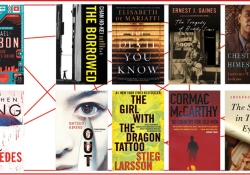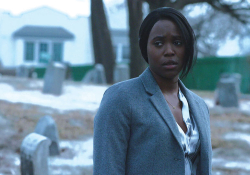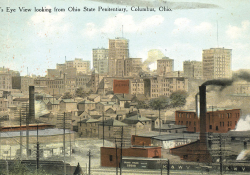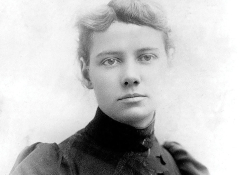A Chat with Eddie Muller, TCM’s “Czar of Noir”
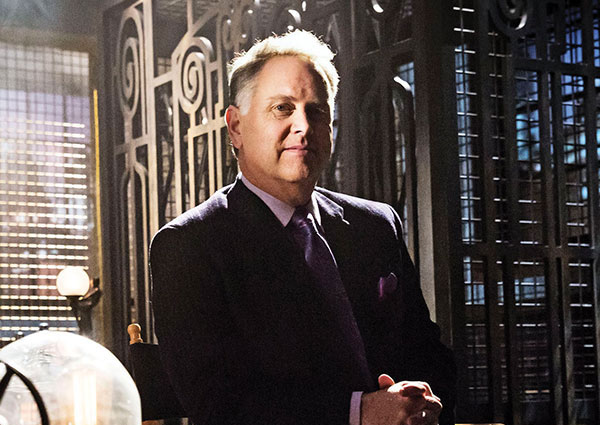 Eddie Muller, the host of “Noir Alley” on Turner Classic Movies, has what just might be the ideal job. TCM is a cultural gem, a visual museum airing silent and foreign movies, curious travelogues, godawful comedies, and all the great movies as well—not to mention all those “B” noirs Muller shares with us. Muller’s website calls him a “wordslinger,” “impresario,” and “noirchaeologist,” but even before TCM put him on the air, he had earned the nickname of “Czar of Noir.”
Eddie Muller, the host of “Noir Alley” on Turner Classic Movies, has what just might be the ideal job. TCM is a cultural gem, a visual museum airing silent and foreign movies, curious travelogues, godawful comedies, and all the great movies as well—not to mention all those “B” noirs Muller shares with us. Muller’s website calls him a “wordslinger,” “impresario,” and “noirchaeologist,” but even before TCM put him on the air, he had earned the nickname of “Czar of Noir.”
Eddie Muller: The job was twenty years in the making, and in none of those years did I imagine being a host on TCM. After I’d written Dark City: The Lost World of Film Noir in 1998, I was asked by the American Cinematheque in Hollywood to program a noir film festival largely based on the book. Well, that festival is now in its twenty-first year, and in the interim I’ve expanded the festivals to eight other US cities, written three more books on the subject (Dark City Dames, The Art of Noir, and Gun Crazy: The Origin of American Outlaw Cinema), and founded the Film Noir Foundation, which rescues and restores at-risk examples of film noir. I’d crossed paths with the good folks at TCM many times, and they recognized that not only did I have a lot of credibility as an “expert” on the subject, I was comfortable in front of crowds and cameras. So they made me an offer I couldn’t refuse. As if.
J. Madison Davis: Do you choose the selections, or are they regularly rotated to exploit TCM’s vast library? I don’t envy you introducing such stuff as Howard Hughes’s production of His Kind of Woman (1951) with Robert Mitchum, Jane Russell, and Vincent Price playing the ham of the century. After all, you can’t go on the air and say, “Here’s two hours of your life you’ll never get back!”
Muller: I loved introducing His Kind of Woman—that might have been my favorite intro to date. There’s such an amazing backstory to the making of it. People often tell me the wraparounds are more enjoyable than the films, which I appreciate—but it also rankles me. I wish they could see the same things I enjoy in the films, but I don’t want to pontificate. I get some backlash when I color outside the proscribed noir lines, showing things like Party Girl (1958, dir. Nicholas Ray) or Talk about a Stranger (1952, with the future Nancy Reagan). Both bend the “rules” of the genre. But since noir is not actually a genre in the first place, I don’t care. I like intriguing, ambitious failures as well as formulaic, by-the-numbers “good” films. The backstories of why the films failed are instructive and, I hope, entertaining.
I like intriguing, ambitious failures as well as formulaic, by-the-numbers “good” films. The backstories of why the films failed are instructive and, I hope, entertaining.
As for choosing the movies, I mostly select them from a master list of what’s currently on license, but programming VP Charlie Tabesh allows me some latitude if there’s a film I really want to show. They’ll make a few licensing deals each season to accommodate my enthusiasm. I’m more involved in scheduling now, so I can place a film in a certain slot, like screening On Dangerous Ground (1951) to commemorate composer Bernard Herrmann’s birthday.
Davis: You were a bartender and then followed in your father’s footsteps as a newspaperman. It seems like perfect training for a noir-meister. “Set ’em up, Joe, I’ve got a little story.” And no college for you, which used to be somewhat traditional in the “rag trade.”
Muller: I recently talked to a college professor who was perplexed by the show’s success. “You have no training,” the guy said. That pleased me no end. He’s right, I have never had any academic indoctrination. I honed my critical thinking as a journalist, not in a classroom. My take on movies is informed by research into the making of the films, not by the kind of critical analysis that too often relies on specious interpretations to bolster preconceived agendas. To put it as simply as possible, the academic approach to film fosters exclusivity—only the “learned” truly understand. My approach is inclusive—I want as many people in the tent as possible, because, bottom line, my job is to perpetuate the value of these films in an increasingly ignorant, apathetic culture.
As for the bartending part . . . I pissed off the organizers of a writing conference one time when I told the “students” that if they wanted to “write,” they needed to learn to tell a story first. I encourage wanna-be writers to take the most compelling story in their life, go into a bar, and tell it to a stranger. If they tell you to beat it, try some other line of work. If they buy you a drink and say, “Tell me another one”—you’ve got a chance. You have to be able to tell a story, not just write one. Because either way, you are vying for an audience’s attention—whether it is a single reader or millions of people watching on television.
Davis: Your dad earned the newspaper nickname of “Mr. Boxing.” It’s interesting to me how boxing has attracted so much high-quality writing in general, but also for the movies—The Harder They Fall (1956), Million Dollar Baby (2004), Requiem for a Heavyweight (1962). And most good boxing movies are noir-based, don’t you think? As a boy, I first saw The Set-Up (1949) with Robert Ryan on TV. I still remember the impact of that brutal ending. The film gave me an insight into a reality that we often would rather not contemplate.
Muller: Boxing is by far the most theatrical of sports. Two combatants are on a stage, in the spotlight, waging a battle that is real. It’s a matter of life and death. The spectacle will always fascinate writers and filmmakers. What you’re saying is especially true of boxing films made in the 1940s and ’50s, because that was the first time that organized crime’s influence in the sport was made public, in Congressional hearings. You see that in Abe Polonsky’s script for Body and Soul (1947); it’s a fairy tale based on fact. The appeal to writers is that boxing is a pitched battle between man’s best and worst instincts; cruelty and nobility clash head-on.
Davis: Which, of course, leads to the question you must have been asked a million times. What is noir to you? Some see it strictly as a film style; others find all sorts of philosophical import.
Muller: I consider it an organic artistic movement, driven by the desire of the creators to offer a more mature view of human affairs. It’s the flip side of the myth of “happily ever after.” Its impact and influence come from having emerged in a time when these themes were squashed by the film industry’s guardians. Not everyone making what we now call “noir” was trying to make a philosophical statement. Most of them just wallowed in the liberation of finally being able to tell stories in which the protagonist could be a bad guy. It’s really that simple. A noir story is about people who know what they’re doing is wrong, and they do it anyway. And, typically, there’s hell to pay. We love watching them break the law; we love watching them reap the consequences.
Davis: Of all the noir films, which embodies the essence of noir, a work of great art that somehow captures it all? I’m still on The Set-Up, myself. Thanks to TCM I was stunned by the original The Racket (1928), the Lewis Milestone one, which seems to me darker than I expected for the time period.
The two films I’d recommend to anyone who wants a crash course in noir are Double Indemnity (1944) and Out of the Past (1947). They pin the noir meter, so to speak
Muller: The two films I’d recommend to anyone who wants a crash course in noir are Double Indemnity (1944) and Out of the Past (1947). They pin the noir meter, so to speak. There are lots of films from the silent and pre-Code eras that exhibit all the hallmarks, but they’re one-offs, not part of a movement: Sunrise (1927), Asphalt (1929), Thunderbolt (1929), A Cottage on Dartmoor (1929). These and many more anticipate the noir movement although they’ve never been classified as such.
Davis: “Noir” has become a word directors on tour invoke to justify their otherwise uninteresting thrillers. Often it seems merely to mean the main character is a loser or the ending is grim. That’s not noir to me. Tragedy is more than just a sad story, and noir is more than just a grim tale about losers. The statement they both make is that the universe is indifferent and often just brushes someone off the counter. But there’s also the element that something in the main character’s nature is inviolable. It makes it impossible for that person to do anything other than what leads him, often knowingly, to destruction. Oedipus has got to be Oedipus and Walter Neff (Double Indemnity), Walter Neff. There are outside forces, but the noir character can’t be other than he is and achieves a limited nobility in it.
Muller: Dennis Lehane has called noir “working-class tragedy.” There’s something to that. What I look for in noir is a sense of empathy—I want the writer and director to make us care about that person that is morally compromised. This is the great catharsis in art, to vicariously act out one’s worst instincts, to feel the tragedy of a wrong decision. I have no interest in the work of filmmakers who take an almost gleeful pleasure in watching the characters suffer.
I want the writer and director to make us care about that person that is morally compromised. This is the great catharsis in art, to vicariously act out one’s worst instincts, to feel the tragedy of a wrong decision.
Davis: Noir also seems to be an awareness brought to the forefront in a specific generation. Even though you can find a noir sensibility in things made earlier, it seems so much a product of the postwar period. I’ve often thought that noir is where you come out after seeing the horrible, random violence of the war. You’re an ordinary guy. You get drafted. You learn quick that your fate is not your own. It doesn’t even deserve the glorification of the word “fate,” so have a belt and deal with it. It’s not that the noir sensibility doesn’t exist outside of that time period. It’s more universal than that. It’s more like it crystallized in these movies, in that period, like classical tragedy in ancient Athens.
Muller: Have you read Robin Robertson’s The Long Take? It’s an ambitious long-form poem that conjured precisely what you are describing. Nominated for the 2018 Man Booker Prize for literature. Which is a little ironic, don’t you think? The books and movies that he’s found a “literary” way of honoring certainly were never nominated for prizes. It’s a period piece, yes. But I think noir is still viable today; Breaking Bad strikes me as maybe the most popular example of the noir ethos in mainstream American culture. Lots of people would scoff at that; “Where’s the femme fatale? Where are the shadows?” To me, the story of a married chemistry teacher who becomes a drug kingpin . . . pretty damn noir.
Modern noir is not about the window dressing. The minute you try to re-create that, the majority of people look at it as a parody. Curtis Hanson was very smart when he made L.A. Confidential (1997)—he nixed the fedoras, even though it was inaccurate to the period. In that era, they would have worn hats, all the time. But he knew modern audiences wouldn’t take the film as seriously if the guys wore hats.
Davis: Most foreign authors I have met are much more into noir than the “traditional” mystery, demonstrating the international appeal of noir. The French praised Jim Thompson and David Goodis when such writers got high-hatted here.
Muller: I completely agree. It goes back to what I said about empathy. Other cultures have more acceptance of, shall we say, the “failings” of human nature. In America right now, where superhero movies dominate, we are obsessed with moral righteousness. Everybody in the public eye is expected to be some paragon of virtue. American culture has become so brazenly bizarre that the artists can’t seem to keep pace. Plus, noir stories are by nature minimalist, and the people who parcel out the money in this country aren’t as interested in minimalist art. They want the spectacle.
Davis: One final question. That TCM Wine Club you advertise, with labels and blends suggested by movies—is the wine any good?
Muller: Yes! It’s a nice perk. I’m not a wine snob. Cases of it just show up on my porch and I’m happy to drink it. I haven’t uncorked the Marx Brothers wine yet; I’m convinced something’s going to pop out of the bottle.
April 2019


